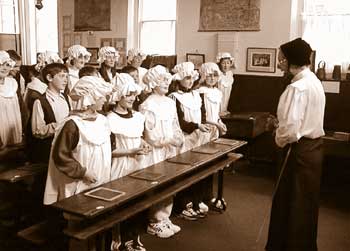
This is what all education is like - FACT.
I've complained about the "education is broken" meme before - my reservations about it have been threefold:
i) It's just lazy - saying something is broken (or dead) avoids having to do any subtle analysis and appeals to a simplistic viewpoint.
ii) It frames technological change as a crisis and not an opportunity - Mike Caulfield covered this better than me, but once you adopt a 'broken' metaphor then a whole set of language accompanies it which frames it as a negative problem to be fixed.
iii) It's suspicious - those who peddle the "education is broken" line usually have something to gain from its acceptance. Either they are directly selling a solution that will mend it (after all, a broken something needs to be fixed, see point ii) or they have individual prestige in being seen as someone who can at least see the means of fixing it.
I've been studying the Masters in History at the OU recently (it's an 18 month long haul, only 2 months in). So I thought I'd reflect on how 'broken' this experience feels. The answer is, well, not at all really. This isn't an advert for the OU, I'm sure the majority of reliable HE institutions would provide a similar experience. The point is that it isn't a radical course in terms of approach or technology, and so provides a reasonable experience of what education is really like I think. I'm sure there are plenty of worse examples, and grudgingly, maybe I'll concede there are some better ones, but this is what distance education in the 21st century roughly equates to, I'd hazard.
First of all we had to read quite a dense text (Davidoff and Hall's Family Fortunes), we were provided with reviews around it and the first assignment was based around analysing its approach. The aim of this was, I think, to introduce us to the type of academic writing in history (I suspect it weeds out the people who really just want to do genealogy), and to think about the range of references and resources required to provide a comprehensive argument (Davidoff and Hall are exhaustive, and at times, exhausting in this respect).
The assignment was an old fashioned 2500 word essay. And it worked - I read the book in a much more analytical manner because of it, I followed up references, I considered the manner in which evidence is found and constructed to form a picture, I engaged with fellow students in the VLE (shhh).
We're now on to a more active block, looking at the range of online resources. This is enjoyable stuff, I really didn't know there was just soooo much stuff out there. I have been lost for a few evenings in the House of Commons Parliementary Papers, or the Proceedings of the Old Bailey, or the National Library of Wales, etc.
I'm not going to do a critique of the course, but studying it has reinforced my belief that "Education is broken" is an unhelpful stance to take. For a start it doesn't reflect the reality. I would urge anyone who uses this claim to study a course outside of their own domain of expertise and see how it feels (I'm obviously focusing on higher ed here, the claim is also frequently used for K12, which I can't claim expertise in). I think many protaganists are basing their claims on rather outdated views of what it feels like to be a student.
But more importantly, if one adopts the broken stance then you want to start afresh. In my experience this isn't beneficial. I can see how you could take the existing course and maybe add some new elements in to it, or campaign for open access to all historical archives for instance, explore new forms of assessment, find ways of making such courses more accessible and open (I didn't say MOOC, no sir), etc. These are opportunities to build on top of a successful approach, which seems a better, if less sexy approach, than demanding wholesale revolution with some glorious new leaders installed.
Reflecting on this has made me think of a fourth reason why I don't like the 'education is broken' rhetoric, and that is it is fundamentally cliquey or elitist. It's underlying message is "all these other people don't get technology like we do. That's why they're stuck in that old fashioned way of thinking which we know is hopelessly broken. Come join our new gang." But of course, if this new gang became the establishment they'd quickly abandon it. They don't really want educational change, they just want to feel cool for a while. Let them do that, we can do better.
